How to choose an eCommerce platform?

On this page
If you are thinking of starting an ecommerce business, there are so many options to consider: platforms, marketplaces, website builders… What are they? Which ones should I use?
This guide is intended to help you make sense of the ecosystem and work out what options are best for you to achieve success for your business idea.
We will start by looking at eCommerce platforms: what are they? How to choose a platform? We will go further by looking at a comparison of the most popular eCommerce platforms.
In the second part of this article, we will look at other options merchant have for selling online, such as marketplaces and website builders.
What is an eCommerce platform?
eCommerce platforms are powerful software applications that allows businesses to create and manage online stores. The main features provided by eCommerce platforms include: catalog management, shopping carts, checkout pages, payments, order management, and customer management.
There are two main categories of eCommerce platforms:
Self-hosted - where the business hosts the platform themselves (on their own server)
SAAS (Software as a Service) - where the eCommerce platform provides the infrastructure to run the online store
With the SAAS options, there is less flexibility and control over the infrastructure, but it usually reduces the cost and effort required to maintain your own infrastructure and servers.
How to choose an eCommerce platform?
A good way to choose an eCommerce platform is to list out all the features that you need, especially regarding:
Catalog management - What is the size of the catalog? Can products be configured by the users, selecting options such as selecting a size and a color for a t-shirt? Are there any customizations required such as engraving? Are the products physical or digital products (or both)?
Customer management - Will it be useful for customers to have an account on your store? Do we want to enable customers to login with their existing accounts, such as Google, Facebook or Twitter? Is the main audience of the website B2C or B2B?
Shopping cart - Are there any specific requirements for the cart such as product upsells or shipping discounts?
Promotions - What type of promotions are you planning on running? Are you planning to create and use coupon codes?
Payment gateways - What payment gateways would you like to support (such as credit card, PayPal etc)? Do you plan on offering payment in instalments for your customers?
Shipping - Are there any built-in integrations with your 3PL or shipping provider?
Email - Are there any integrations or apps with your email marketing software?
Reviews - Are there any integration with your reviews app?
Social commerce - Is there any integration with Facebook and Instagram shops?
Finally, is there anything specific to your business that you would like to achieve, such as: selling limited edition products, offering subscriptions, rewards and referrals, advanced promotion rules etc.
eCommerce platforms: Comparison table
Our review covers the most popular eCommerce platforms, including: Shopify, Shopify Plus, Magento, BigCommerce, WooCommerce and PrestaShop.
| Shopify | Swell | Magento | BigCommerce | WooCommerce | PrestaShop |
Lowest cost plan | £19/m | $0 + 2% of sales | Free for self-hosted~ | $29/m | Free - self-hosted~ | Free for self-hosted~ |
SAAS | Yes | Yes | Yes as Adobe Commerce | Yes | No | No (3) |
Self-hosted option | No | No | Yes | No | Yes | Yes |
Unlimited products (2) | Yes | Yes | Yes | Yes | Yes | Yes |
Product variants | Yes - with limits | Yes - unlimited | Unlimited | Yes - with limits | Yes | Limited to 1,200 combinations |
Promotions | Yes | Yes | Yes | Yes | Yes | Yes |
Gift cards | Yes | Yes | Requires extension | Yes^ | Requires extension | Requires third party app |
Checkout customization | No * | Yes | Yes | Yes | Yes | Yes |
Customer accounts | Yes | Yes | Yes | Yes | Yes | Yes |
Subscriptions | Supported* | Full native support | Requires third party app | Requires third party integration | In house extension available (1)
| Requires third party app |
Community | Forum | Github Discussions | Forum | Forum | Facebook Group | Forum & Slack |
Open source | No | No | Yes | No | Yes | Yes |
* Shopify has implemented native-like subscription functionality in their checkout and API but you still need a third party app to use this functionality. There are options for checkout customization with Shopify Plus.
~ When using a self-hosted solution, you will need to factor in hosting costs.
^ BigCommerce’s built-in gift cards are styled as gift certificates.
(1) If you use WooCommerce Payments in the USA, subscription functionality is included.
(2) If you sell 10,000s of products or greater, we recommend seeking expert advice. This is because some solutions, especially self-hosted ones, may run into performance issues when handling very large product volumes.
(3) A hosted option, PrestaShop Platform is also available.
eCommerce platforms: Reviews
Shopify
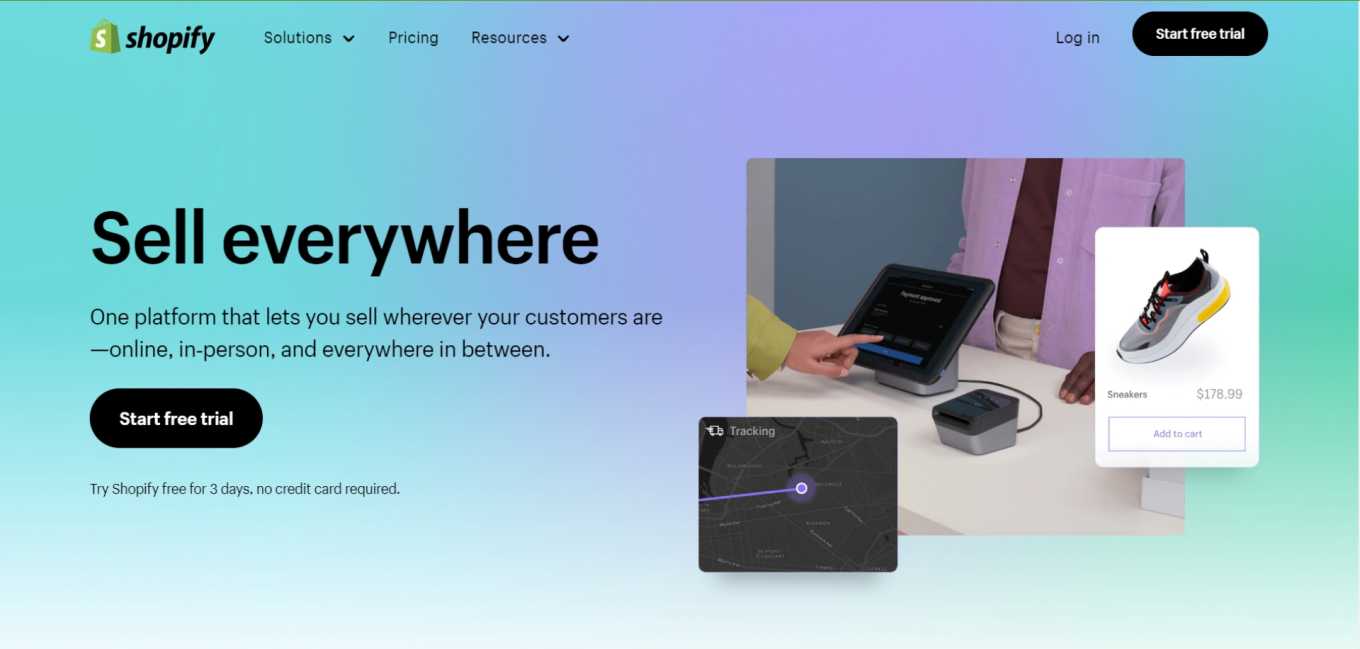
Shopify is possibly the best known modern eCommerce platform. It is an established SAAS platform popular with DTC brands, offering all the core features you would expect.
What we like:
Easy to get started and an eCommerce site with Shopify themes
Tons of integrations and apps to extend your store’s functionality
Built using modern tech
Full support for headless storefronts
A checkout that is well known and recognizable by customers
Shop Pay saves customer payment information for use across all Shopify merchants
Things to bear in mind:
Although Shopify Checkout now supports subscription products, to use the subscriptions you will need a third-party subscription apps, adding cost and complexity. Read more in our review of the best Shopify subscriptions apps.
If you choose a headless storefront, some apps in Shopify Marketplace will not work or will not provide full functionality
Some API features, such as automated gift card creation, are only available on Shopify Plus
Product variants are limited to 3 options and 100 variants per product
Swell
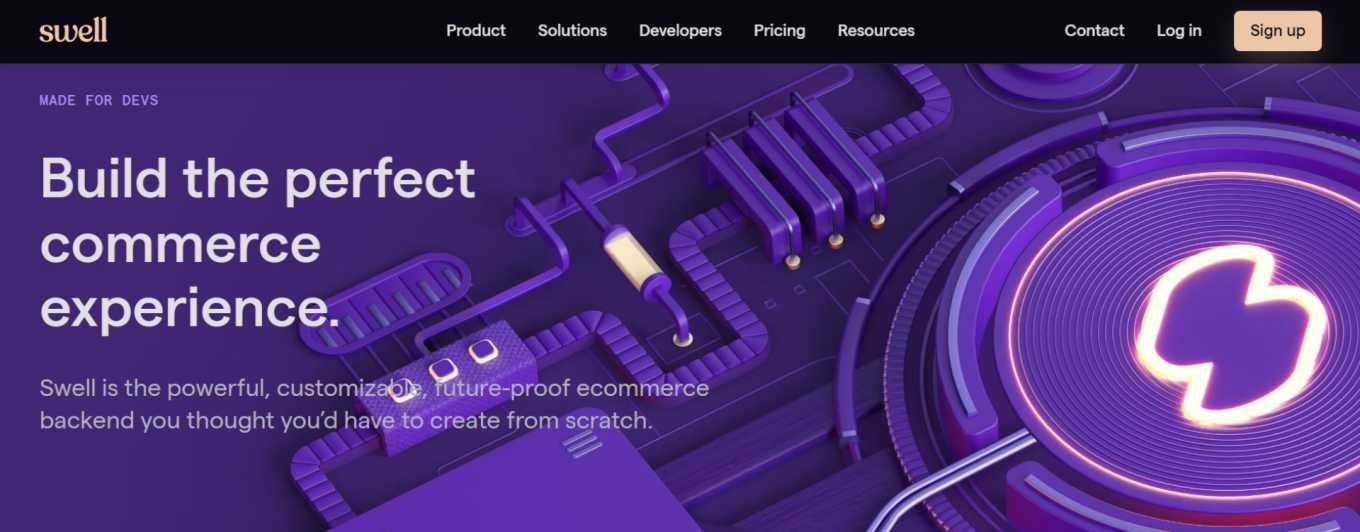
Swell is an innovative and cutting edge SAAS eCommerce platform with powerful native features allowing you to go above and beyond in your eCommerce capabilities. It is designed to be developer friendly allowing easy extension of its capabilities with the help of a development agency.
What we like:
Native support for subscription products
Unlimited and fully customizable product variants
Built using modern tech
Supports headless storefronts from the ground up
Community plan allows you to get started with a new store without committing to a monthly cost upfront
Customizable content models give a high degree of flexibility in structuring your store with the help of developers
Designed to be developer friendly from the ground up, making it easy to fully customize all aspects of the customer experience with the help of a development agency
Things to bear in mind:
Swell is a cutting edge startup and does not yet have as many integrations as more established platforms. However, due to it’s developer-friendliness, with the help of a development agency you can integrate with any platform that offers API access
Magento 2 (Adobe Commerce)
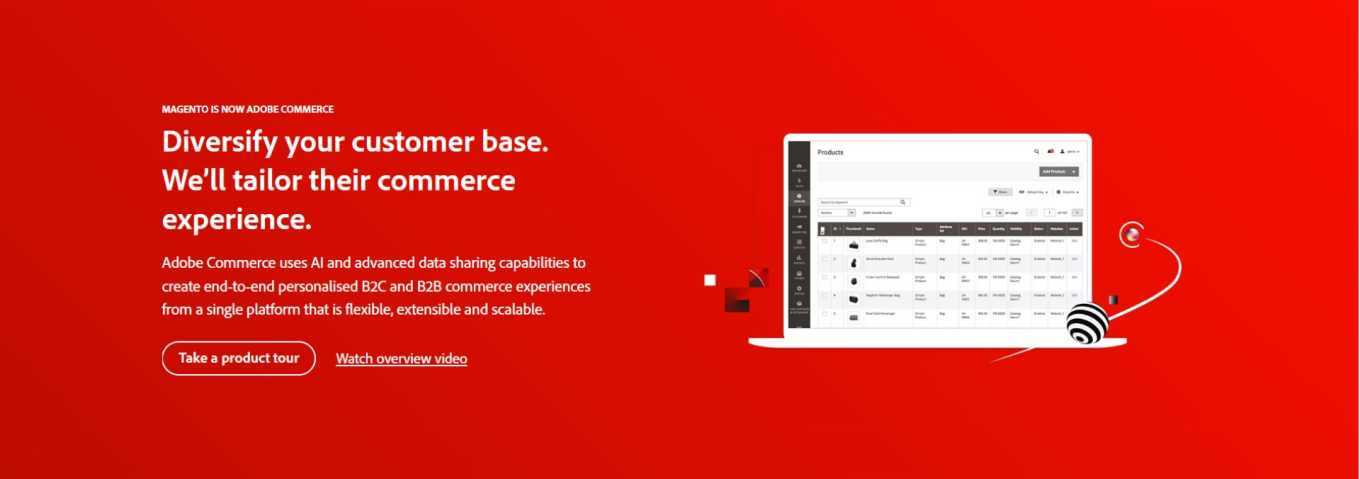
Magento is an open source eCommerce platform with a self hosted option and a managed solution provided by Adobe Commerce.
What we like:
Highly extendable and customizable with the help of a developer agency
Open source option with basic features allowing you to get started at minimal cost and extend the functionality with the help of a development agency
Adobe Commerce hosted option comes with drag and drop page builder allowing you to quickly create content for your site, bringing in developers only when you need more custom functionality
Things to bear in mind:
If you go for the open source option, you will need to consider hosting separately.
Magento is built using older tech.
BigCommerce
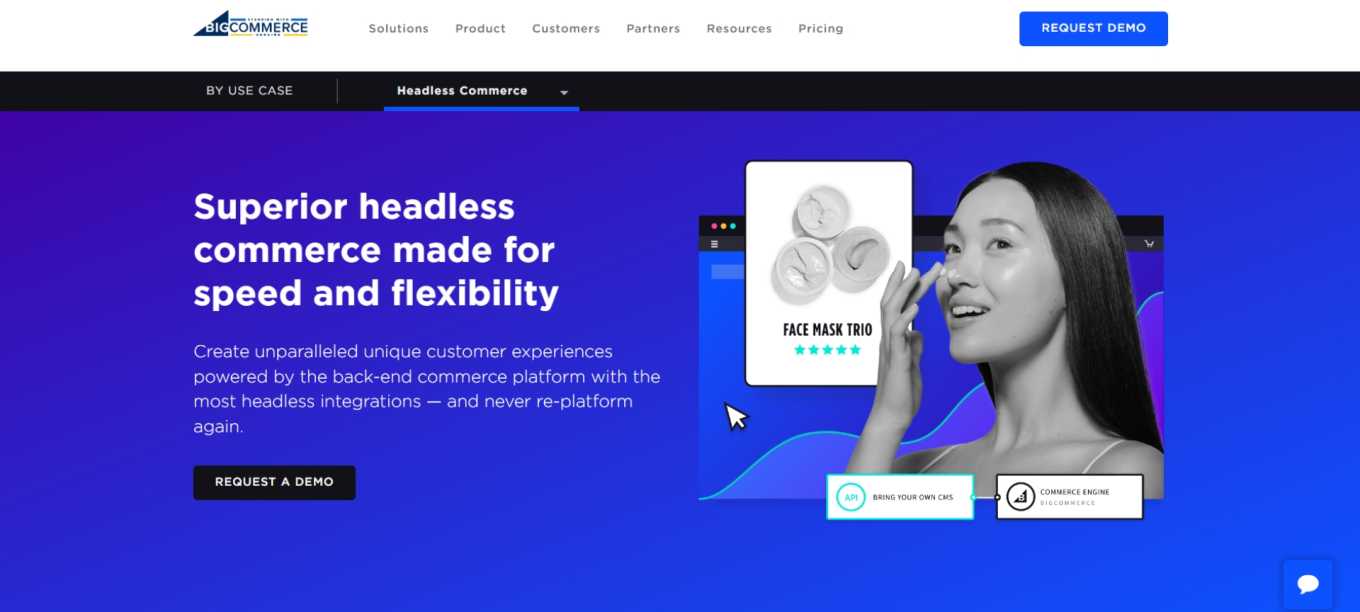
BigCommerce is an established SAAS eCommerce platform offering all the core features you would expect from a DTC and B2B eCommerce platform.
What we like:
All plans include a staging store allowing you to test changes and see how new products will look without affecting your live store
Wordpress integration, if you have an existing Wordpress site and want to add a fully fledged eCommerce platform, BigCommerce is a great option
Things to bear in mind:
BigCommerce does not natively support subscription products, so you would need to integrate with a third party service to sell subscription products, adding additional cost and complexity
WooCommerce
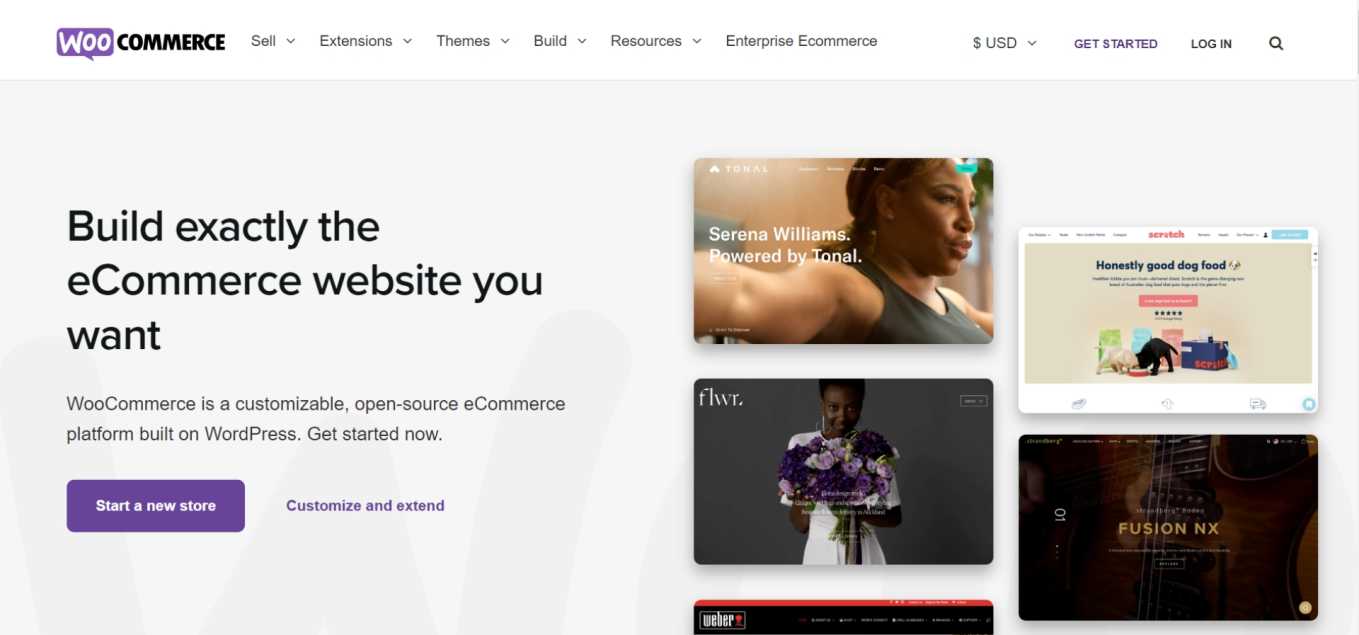
WooCommerce is an open-source plugin and eCommerce platform for Wordpress that turns a Wordpress site into a fully-featured eCommerce site. It can be a good option if you have an existing Wordpress site and want to get started with eCommerce quickly, retaining your existing site and having the option to customize and extend the platform’s functionality in the future with the help of a development agency.
PrestaShop
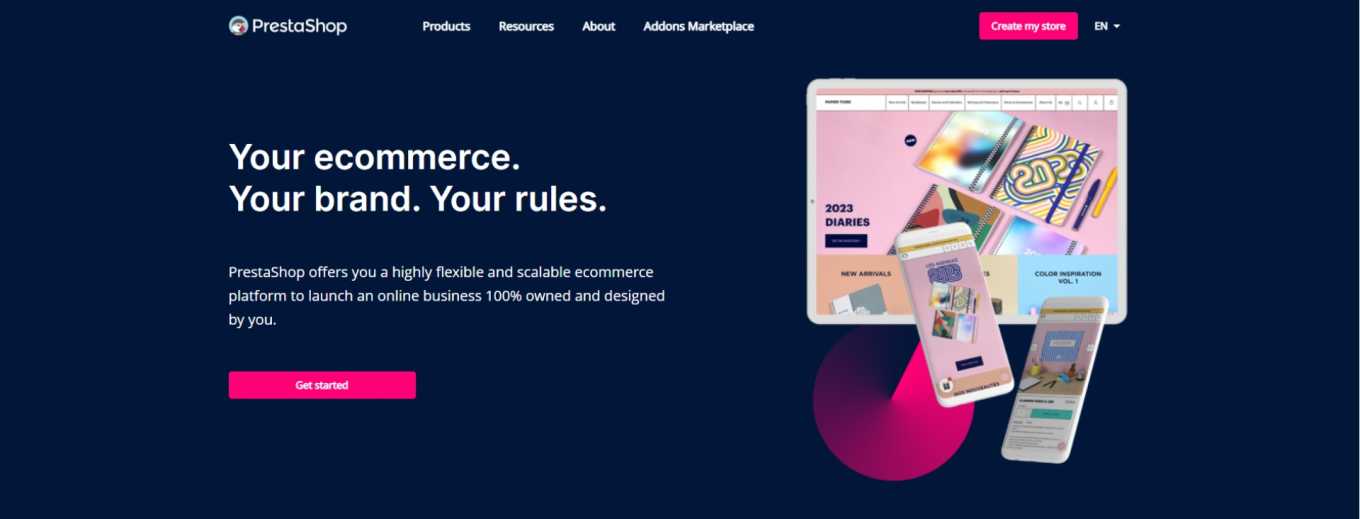
PrestaShop is a self-hosted European open-source eCommerce platform headquartered in France. A managed hosting solution is also available. It is a good option if you are looking for an eCommerce platform based in the EU and the ability to self-host your eCommerce backend.
Other options for selling online
If you want to get started with eCommerce but are not ready for the effort of managing a full eCommerce site or the full suite of features offered by eCommerce platforms are overkill for your brand's needs; you can also start selling online using website builders, PayPal or marketplaces. Here is our review of these options.
Website builders with eCommerce functionality
Many online website builders come with eCommerce features. This can be a great way to get started if you have an existing site built with one of these platforms, or you have a business idea but don’t yet have a budget for a development agency to build you a custom site. As you grow and expand your eCommerce business, you will probably want to migrate to a dedicated eCommerce platform. Examples of website builders that have eCommerce functionality include:
Selling with Paypal
If you have an existing website and want to try selling online, you can add a PayPal purchase button to your site. Main features include:
Ability to add eCommerce support to almost any website
Integrates with your existing site, no need to start from scratch
Allows you to accept major debit and credit cards and PayPal payments using PayPal as a checkout
Customers can use their existing PayPal account to seamlessly purchase products on your store
Adding a PayPal purchase button can be a great way to get started with eCommerce if you have an existing website, but as you expand your business you will probably want to migrate to a full-featured eCommerce platform.
You can continue selling with PayPal even after you migrate to a full-featured platform, either by having PayPal as a payment method in the main checkout or keeping a separate PayPal checkout flow.
Marketplaces
Marketplaces can be a great way to extend your reach by getting your products in front of a larger audience. You can often propagate products directly from your eCommerce platform to marketplaces, allowing you to seamlessly sell across your own storefront and on marketplaces, maximizing the chances of business success.
Marketplaces vs. eCommerce platforms
eCommerce platforms | Marketplace |
You control the look and feel of the site | Your products will be displayed on a site controlled by the marketplace |
Your have a custom domain name | Your product pages will be on the marketplace domain |
You are the merchant of record and are responsible for your own VAT or Sales Tax liabilities | The marketplace will usually be the merchant of record and can often handle VAT or Sales Tax compliance* |
You get to keep most of the sale price, minus payment processor and any platform fees, which usually only come to a few percent | The marketplace will take a larger cut, usually in the region of 10-50%. |
* Tax law is complicated and varies by region. You should always consult a professional tax advisor to determine your tax responsibilities before starting to sell online.
Amazon
Amazon is perhaps the best known eCommerce marketplace in the West and many consumers' first port of call when looking to buy something online. This makes it a must-consider if you are targeting major Western markets such as the USA, Canada, the UK and France. Amazon offers a comprehensive range of services to help your eCommerce business succeed including warehousing and fulfillment, gift fulfillment and branded landing pages for your business.
Etsy
Etsy is more of a niche marketplace specializing in artisan designed goods. It is becoming very popular with more discerning consumers looking for something trendy or unusual. Etsy offers a good range of features to help your eCommerce business succeed including personal landing pages, social and messaging functionality and good support for customizable products. Etsy sellers typically offer a more personalized service than other marketplaces, so customers will expect to communicate with a real named person and those extra touches such as handwritten thank you cards.
eBay
eBay is best known as an online auction platform for pre-loved goods but nowadays many sellers use it to sell goods, both new and secondhand, at fixed prices. It is especially popular with smaller businesses.
Walmart
Walmart, one of the biggest retailers in the USA, has become a big name in eCommerce in the American market. In addition to selling their own ranges online, they have a marketplace allowing third party sellers like you to access their customer base. If you are targeting the American market, Walmart is an important marketplace to consider. They offer a comprehensive range of services to help your eCommerce business succeed including fulfillment services and integration with Walmart’s bricks and mortar store network.
AliExpress
AliExpress is a large Chinese eCommerce marketplace known for low prices, frequent discounting and volume discounts. It is important if you want to target the Asian market. It has also become popular with Western consumers, especially the more cost-conscious. Pricing is fiercely competitive so you will need to watch costs and remember if you are shipping from Western countries you will have to compete with sellers using low-cost Chinese international shipping. AliExpress has a good range of features to help your eCommerce business succeed including shipping services, native messaging with buyers and branded landing pages for your business.
Next steps
We have seen that there are great options for building an eCommerce site using some of the most popular platforms such as Shopify, Swell, Adobe Commerce, BigCommerce, WooCommerce and PrestaShop. If you are just starting your journey in eCommerce, website builders or marketplaces can be a great option to get started - even though they can have limitations. For brands that want to go further and offer a personalized experience to their users, they can work with a Shopify developer or a Shopify development agency like us! We also offer services on other eCommerce platforms such as Swell and Magento.



